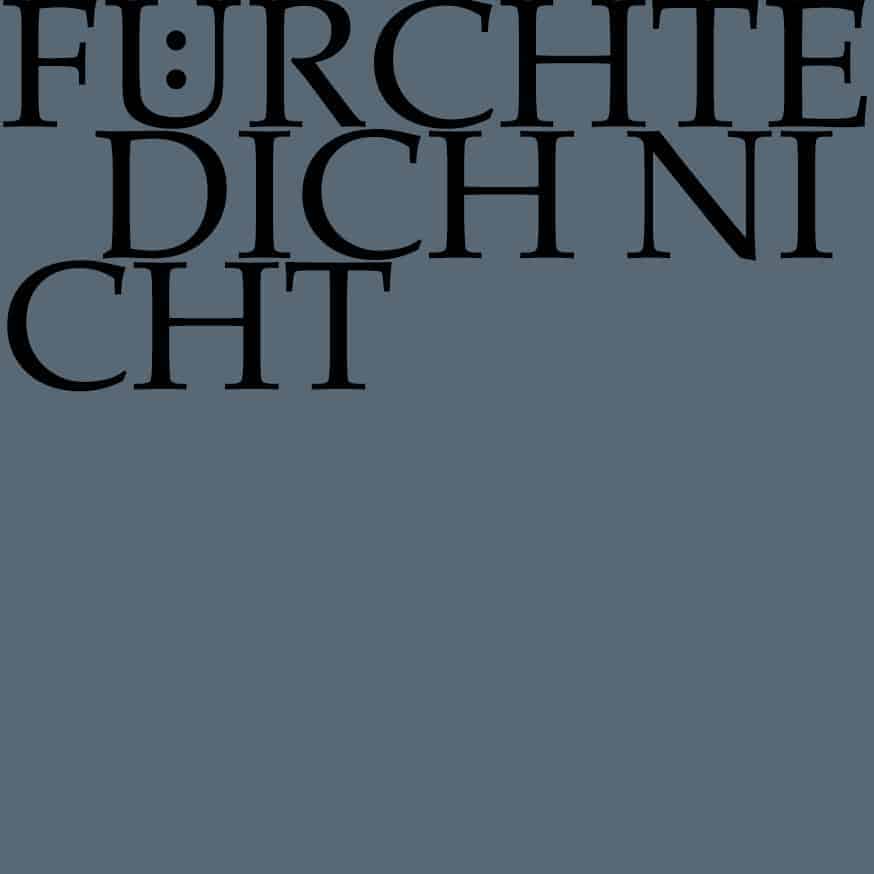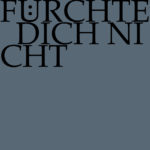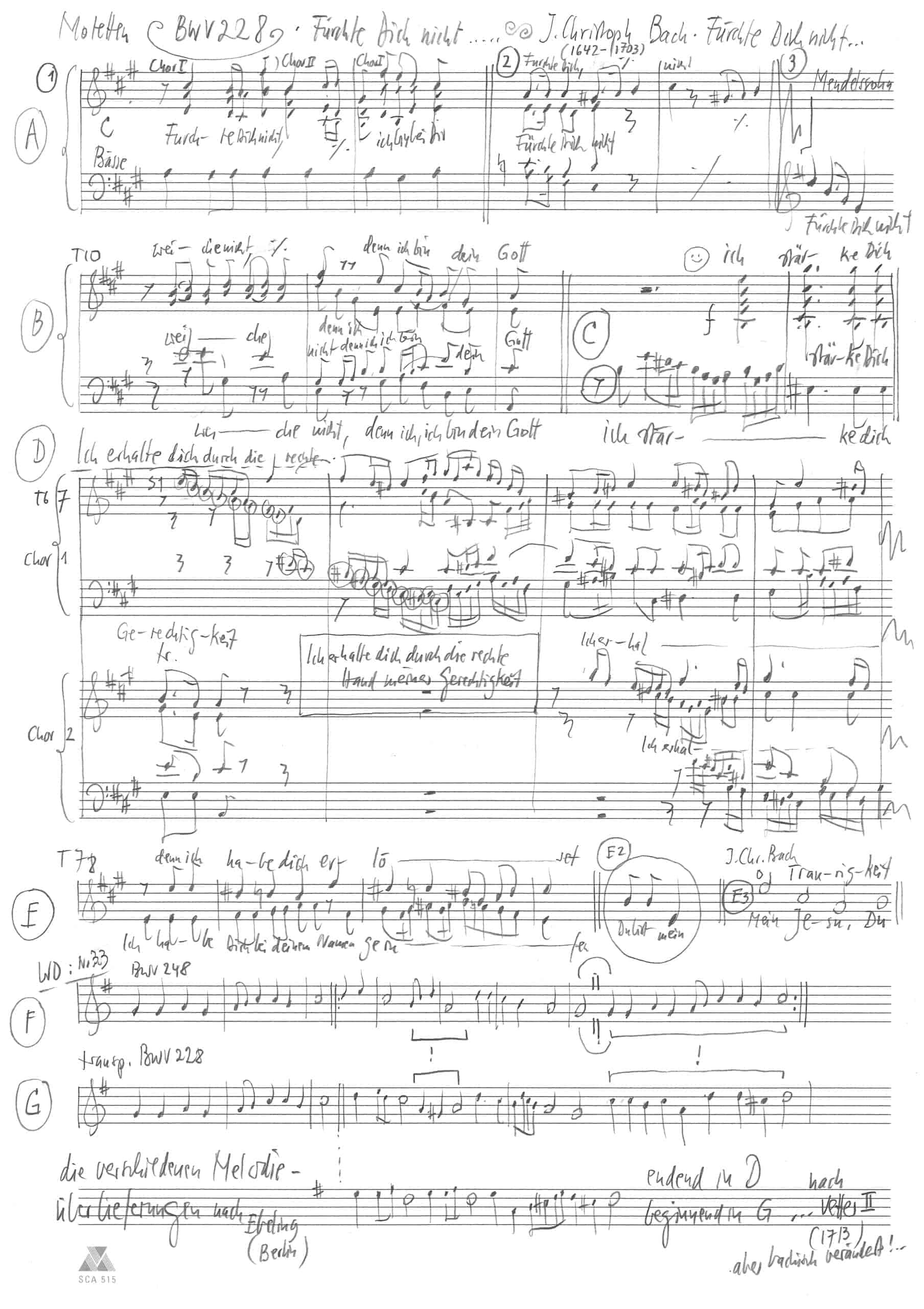
Fürchte dich nicht
BWV 228 // Funeral music
(Fear have thou none) for vocal ensemble (double choir), oboe I+II, taille, strings and basso continuo
Motet by Johann Christoph Bach «Fürchte dich nicht»
Fürchte dich nicht, denn ich hab‘ dich erlöst,
ich hab‘ dich bei deinem Namen gerufen,
du bist mein.
Wahrlich, ich sage dir:
Heute wirst du mit mir im Paradies sein.
O Jesu du, mein Hilf und Ruh,
ich bitte dich mit Tränen:
Hilf, dass ich mich bis ins Grab nach dir möge sehnen.
Johann Heinrich Schmelzer: «Lamento sopra la morte Ferdinandi III»
Motet by Johann Sebastian Bach, BWV 228 «Fürchte dich nicht»

Place of composition in the church year
Pericopes for Sunday
Pericopes are the biblical readings for each Sunday and feast day of the liturgical year, for which J. S. Bach composed cantatas. More information on pericopes. Further information on lectionaries.
Would you like to enjoy our videos ad-free? Subscribe to YouTube Premium now...
Workshop
Reflective lecture
Bonus material
Publikationen zum Werk im Shop
Choir
Soprano
Lia Andres, Felicitas Erb, Simone Schwark, Noëmi Sohn Nad, Alexa Vogel, Mirjam Wernli
Alto
Laura Binggeli, Antonia Frey, Liliana Lafranchi, Damaris Rickhaus, Simon Savoy, Lea Pfister-Scherer
Tenor
Zacharie Fogal, Raphael Höhn, Tobias Mäthger, Sören Richter, Nicolas Savoy, Walter Siegel
Bass
Fabrice Hayoz, Grégoire May, Daniel Pérez, Retus Pfister, Jonathan Sells, Tobias Wicky
Orchestra
Conductor
Rudolf Lutz
Violin
Eva Borhi, Peter Barczi
Viola
Matthias Jäggi
Violoncello
Maya Amrein
Violone
Markus Bernhard
Oboe
Katharina Arfken, Philipp Wagner
Taille
José Manuel Cuadrado Sánchez
Bassoon
Susann Landert
Harpsicord
Jörg-Andreas Bötticher
Organ
Nicola Cumer
Musical director & conductor
Rudolf Lutz
Workshop
Participants
Rudolf Lutz, Pfr. Niklaus Peter
Reflective lecture
Speaker
Muhterem Aras
Recording & editing
Recording date
22/11/2019
Recording location
Trogen AR (Schweiz) // Evangelische Kirche
Sound engineer
Stefan Ritzenthaler, Nikolaus Matthes
Producer
Meinrad Keel
Executive producer
Johannes Widmer
Production
GALLUS MEDIA AG, Schweiz
Producer
J.S. Bach-Stiftung, St. Gallen, Schweiz
Librettist
First performance
Unknown; possibly 4 February 1726,
Leipzig (for the funeral of Susanna
Sophia Winckler)
Text
Isaiah; Paul Gerhardt (1653)
In-depth analysis
The exact occasion for the composition of “Fürchte dich nicht” (Fear thou not, BWV 228) is not certain. Unlike the motets and hymns of the venerable “Florilegium portense” collection (1603–1621) that were used as processionals in Leipzig’s church services and for the Currende (street-choir) performances of the St Thomas singers, Bach’s new motets were occasional works that are believed to have been composed for funerals, although to date this assumption has been verified only for “Der Geist hilft unser Schwachheit auf” (The Spirit doth our weakness help, BWV 226), which was composed in 1729 for the funeral of Johann Heinrich Ernesti, rector of the Thomasschule. A connection between BWV 228 and the 1726 funeral for Susanna Sophia Winckler, a noblewoman of Leipzig, was long assumed due to similarities between the motet text and the funeral sermon (Isaiah 43:1); recent research by scholars Daniel Melamed and Klaus Hofmann, however, has called this connection into question.
The motet, composed in the Thuringian tradition that so profoundly influenced Bach, is set for an eight-voice double choir and simultaneously treats a gospel text and a church hymn. Because the original score has not survived, it is unclear whether Bach intended the vocal parts to be doubled by strings and winds. Nevertheless, because this was a common practice for Bach, as seen in BWV 226 and other related works, for our recording, conductor Rudolf Lutz chose to include an instrumental accompaniment with a continuo part based on the lowest choir voice. Indeed, the inclusion of a harpsichord also breathes new life into an old idea of musicologist Arnold Schering, who conjectured that the harpsichords in Leipzig’s churches, although rarely used in cantata performances, were there for the purpose of accompanying motets.
The motet opens with a dialogue initiated by the bass groups of each choir that furnishes the assurance of “Fürchte dich nicht” (Fear have thou none) with a motivic energy throughout the work and that recurs twice as a framing figure. This gesture of assurance is also composed into the opening motif itself, followed closely by the phrase “Ich bin bei dir” (I am with thee), which appears to answer the question suggested by the intervallic leap on the word “nicht” (not).
After dense choral exchanges on the text of “Weiche nicht, denn ich bin dein Gott” (waver not, for I am thy God), a coloratura on the words “Ich stärke dich” (I strengthen thee) is passed from voice to voice; this passage, thanks to its triumphant style, remains highly popular among the Thomas singers to this day. It then flows into a more subdued section that, so to speak, gradually lifts the curtain on the prophetic text while continually enhancing its import through additional layers of contrapuntal density (“Ich stärke dich, ich helfe dir auch, ich erhalte dich” – I strengthen thee, I also help thee, I uphold thee). Following a renewed acclamation of “Fürchte dich nicht”, the second part of the work melds both choirs in one four-voice entity. The resulting concentration of vocal parts goes hand in hand with a further display of compositional artistry: Bach combines an extended double fugue in the three lower voices (“Denn ich habe dich erlöset, ich habe dich bei deinem Namen gerufen” – for I have now thee delivered, I have thee by thy name now called) with a line-for-line presentation of the two hymn verses “Herr, mein Hirt, Brunn aller Freuden” and “Du bist mein, weil ich dich fasse” (Shepherd, Lord, fount of all pleasure and Thou art mine, for I shall clasp thee) in the soprano voice. This union of meditative calm and polyphonic motion culminates in an eight-voice closing section, which, despite its brevity, maximises the powerful solace of the composition’s central message: “Fürchte dich nicht, du bist mein!” (Fear have thou none, thou art mine!)
Whether Bach personally signed this section of the work by inserting a transposition of his BACH motif in the first bass part is a matter of conjecture – the gift he made with this motet to all future singers and audiences, by contrast, is documented in a Leipzig review of 1837 that opened with a description of a vesper service in the St Thomas church that was nearly ruined by the grotesquely incompetent composition of a young composer. The reviewer then singles out Bach’s motet as a true sign of quality: “… the listeners often stifled laughter, furrowed their brows, suffered earache; no doubt they would have soon departed had not Father Bach stepped in with his world-famous words of comfort: Fürchte dich nicht, ich bin bei dir! Denn ich habe dich erlöset. (Fear have thou none, I am with thee, for I have now thee delivered).”
Among Bach’s collection of works by his forefathers is another setting of “Fürchte dich nicht”, a fivevoice motet by his Eisenach uncle, Johann Christoph Bach (1642–1703), whom Bach admired as a “great expressive composer”. Like BWV 228, this motet also unites a gospel text sung by the choir with a chorale presentation in the descant voice. Both this fifth verse of Johann Rist’s Passion hymn “O Traurigkeit, o Herzeleid” (O grief, o woe) and the promise contained in the closing line of the gospel text “Wahrlich, ich sage dir, heute wirst du mit mir im Paradiese sein” (Truly I tell you, today you will be with me in paradise, Luke 23:43) are suggestive of a funeral work borne by images of the crucifixion. This composition is featured on our CD as a bonus track, together with a Lamento by the Viennese violinist and Vice Kapellmeister Johann Heinrich Schmelzer (approx. 1623–1680). Written for a four-part string ensemble, the Lamento was composed in memory of Kaiser Ferdinand III, a respected musician who died in 1657. Set in the poignant key of B minor, the work is replete with heartrending intervals and desolate, funeral-bell figures and imbued with a noble, personal tone.
Libretto
1. Chor
Fürchte dich nicht, ich bin bei dir,
weiche nicht, denn ich bin dein Gott!
Ich stärke dich, ich helfe dir auch,
ich erhalte dich durch die rechte Hand
meiner Gerechtigkeit.
2. Chor
Fürchte dich nicht, denn ich habe dich
erlöset, ich habe dich bei deinem Namen
gerufen, du bist mein.
Fürchte dich nicht, du bist mein!
3. Choral
Herr, mein Hirt, Brunn aller Freuden,
du bist mein,
ich bin dein,
niemand kann uns scheiden.
Ich bin dein, weil du dein Leben
und dein Blut mir zugut
in den Tod gegeben.
<strong>4. Choral</strong>
Du bist mein, weil ich dich fasse
und dich nicht, o mein Licht,
aus dem Herzen lasse.
Laß mich, laß mich hingelangen,
da du mich und ich dich
lieblich werd umfangen.
Dear Ladies and Gentlemen
dear musicians, technicians and those involved in the organisation, dear Bach community,
This is not the first time I have heard this motet, the motet “Fürchte dich nicht”.
That is not surprising. After all, I had to prepare my reflection for tonight. Nevertheless, it almost seems to me right now as if I am hearing the “Fürchte dich nicht” again for the first time today. Probably because the music simply touches me. Because it triggers something in me. And for me it also shows the universality, the timelessness, yes, the power that is in this motet.
Allowing oneself to be touched again and again. To perceive this spark of “as if for the first time”. I believe it is worthwhile to let this spark of “as if for the first time” arise, to look for it – in music, in people, in communities.
I have therefore decided not to provide you, dear audience, with an abstractly polished reflection today. Instead, I want to take you with me: To the “Zum ersten Mal” motet “Füchte dich nicht” for me. And I want to take you with me on the paths of thought that followed.
First of all, I would like to say that I love listening to classical music. I regularly go to the opera in Stuttgart. Reflections on various topics also occur very regularly in my everyday life as a politician, especially as President of the State Parliament. Politics always concerns the entire coexistence in a society. Of course, the topics are diverse. But both together, reflection of a piece of classical music – that is a first for me. So it is also a “first time” in that respect.
So a few weeks ago, in the evening after a plenary session, I sat down in my office and called up YouTube. I admit I was a bit tired that day. The debates in Parliament had been intense, sometimes heated, even the odd verbal border-crossing had unfortunately taken place. On my secretary’s desk was a tasteless hate letter for me. (I’ll spare you the wording).
In a nutshell: I was happy to retire to my office and have a few minutes to myself. So I called up Youtube, typed in: “Bach Motette BWV 228”. I already had the documents in my hand, which I wanted to look through in the meantime. But I didn’t get around to it at all.
The music, the voices, captivated me from the first moment.
Do not be afraid.
Don’t move.
What energy!
What power!
In these two sentence fragments alone!
I continued to listen and then wrote down the first thing that came to my mind.
These were the four adjectives: urgent, demanding, stirring, convincing.
I was wide awake again. I picked up the lyrics and played the piece again from the beginning. Again, that energy.
The second time, I didn’t just listen with my heart. My head joined in.
Do not be afraid!
Do not retreat!
It sounded like a mandate to me.
I thought of liberal democracy and the threats it faces. In Germany. In Europe. Threats like growing anti-Semitism. Right-wing extremist violence. Political murders. Just think of the recent, fortunately failed attack on the synagogue in eastern Germany. In which, unfortunately, two people nevertheless lost their lives. Or the right-wing extremist murder of the CDU politician Walter Lübke in south-west Germany this summer.
And there are also the somewhat more subtle threats to democracy, such as hatred and incitement on the streets and in digital networks. And the most worrying thing from my point of view: the shift in consensus. Or to put it another way: What can be said, what can be thought, is moving to the right, towards misanthropy, away from the principle of inviolable human dignity. Racism and discrimination are seeping into the language games of public opinion.
Do not be afraid!
Do not retreat!
I heard a mandate to democrats.
I heard an order very personally to myself.
Musically, I find it very interesting that Bach, in my opinion, also depicted this commission with the two choirs: The higher soprano, alto and tenor voices seem like fear itself – anxious, frightened, fearful. The lower bass voices, on the other hand, form a foundation, radiate confidence in their stability, trust, serenity.
Both levels together create for me, right at the beginning of the motet, this urgent, demanding mission. And then – what a relief! – into these wonderful lines “I strengthen you”, “I also help you”. After the commission comes the offer:
I strengthen you.
I help you.
Similar to Greek mythology. You may be familiar with the archetypal hero’s journey, which forms the basic pattern of many myths and also of many stories today. In it, the hero – and today, fortunately, also the heroine – first receives the call of adventure. Those who follow the call receive support from mentors, gods or magic. After the mission comes the offer.
Musically, I noticed that out of the 8-voice choir, a single voice initially leads the way. A first, single “Ich stärke dich” before the other voices join in. Perhaps this first, clear voice means one’s own inner voice, which needs to be heard in the face of fear. One’s own inner voice. Perhaps also the voice of God. Or the voice of a good friend who says, “Hey, you can do it!” “I support you!” “Keep going!”
As if, in the face of a threat, we must first gain our own sovereignty and then receive support and help from the chorus of voices around us.
I am thinking of the countless people who, especially in these times, are committed to our liberal democracy, to an open society, to living together in tolerance and diversity. Who take a stand at the workplace, in the neighbourhood, in the club or in the community centre: against exclusion, against racism, against discrimination.
From the urgent, demanding mission: Defend our free democracy!
Do not deviate!
To the rousing, convincing offer: We join in! We support you!
I strengthen you!
What I particularly like about this motet is that the musical structure is very complex. Nevertheless, the individual voices complement each other. There would definitely be something missing if there were one voice less. At the same time, no voice is too dominant. No voice drowns out the other voices. For me, this is the ideal of our parliamentary democracy: every voice is heard. And our task is to find a consensus.
In this way, we compose a policy that expresses what a society wants and that bundles the voices of society: to live together freely and fairly for all.
Bach Hören is thus a wonderful reminder for us, of the ideal of democracy, of the interplay in a society, of the musical in a community.
At the same time, the text of the motto “Fürchte dich nicht” puts the individual, the single person in the centre. And thus creates an expression of the dialectic between the individual and society. The line “Ich habe dich bei deinem namen gerufen” makes this very clear.
Being called by one’s own name is something very personal. I, human being, am recognised, I am named, I am called, I am allowed to be with my very own, unique identity. I, the human being, am the relevant reference point in democracy as well.
The state protects my basic rights. It grants me rights of freedom such as freedom of religion and freedom of opinion. It guarantees me equality rights such as equal treatment before the law. It grants me rights to benefits, such as the right to petition.
And in a democracy, we are entitled to these basic rights simply because we are human beings. We should decide for ourselves how we live and what we think. We are not a “uniform mass”, we are not a “body of people”, we are not a “dehumanised system” as right-wing populist views suggest.
We are unique, very different and diverse. And both are reflected in the protection of fundamental rights: the individual with his/her inviolable dignity. And human coexistence in the basic rules to which we adhere.
Incidentally, this is also where politics and religion meet: the motive is the human being. This motive must always resonate. We must listen to this motive, even when slogans become loud, when images of the enemy frighten us, when the “us against them” swells in us and around us.
“Ich habe dich bei deinem Namen gerufen.”
Bach’s motif is also the individual human being.
Ladies and gentlemen,
This evening, when I heard the “Fürchte dich nicht” for the first time, will certainly remain in my memory. The music gave me courage, gave me confidence.
We, you and I, are about to hear the motet for the second time. And I want to make a suggestion to you about it:
Let us look for the spark of “like the first time”. Now while listening to the motet. And fundamentally as individuals in our social interaction, as citizens of our liberal democracy.
Let us break open the certainties, the self-evident things, the entrenched things.
And let us look with new eyes – as if for the first time – at democracy
– at our rights and at our freedom.







